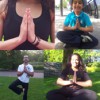On March 8, 2014, thousands of women in London marched in a rally held at Trafalgar Square, in solidarity with Europe’s largest women’s march: “Million Women Rise.” The goal of this rally is to end male violence in all its forms.
Solidarity amongst women is key.
The media has worked to nurture a society which pits women against one another, creating a desire for consumerism based upon disparity—“I want what she has; why don’t I have what she has?” This in turn may lead to feelings of jealousy and inadequacy—resulting in the need to have. Society has often worked to create disengagement from community. This is a key achievement and requirement of those in a position of privilege. It creates distraction, energy is expended against one another, and focus is diverted from the oppressor. It serves to maintain a status quo—that of privilege and supremacy.
 Community is our strength and an energy of love.
Community is our strength and an energy of love.
It nurtures. There is great creative energy in being a woman and sharing with other women. A community of kindness, support, laughter, love, and acceptance.
At the rally, it was refreshing to see women of all diversity, where appearance and status was of no value—all standing in solidarity and demanding an end to male violence. A platform was kindly provided by Million Women Rise (MWR) for women who wanted to speak about violence against other women around the world, such as the Palestinian female political prisoners.
Male violence is a global pandemic.
The aim of MWR is to end male violence against women and children.
The campaign believes that solidarity amongst women is key to achieving this objective, as “Unity is strength and the voices of many are louder together, than a single voice.”
MWR describes male violence against women and children as a global pandemic which devastates lives and communities and threatens to undermine efforts to bring about sustainable development.
This campaign is an international struggle for the freedom and emancipation of women.
MWR refers to statistics to highlight the reality in the UK today. These facts are unacceptable and evidence the immediate need for change. They include:
• One woman in four will experience domestic violence at some point in her life.
• Domestic violence has more repeat victims than any other crime (on average there will have been 35 assaults before a victim calls the police).
• Two women are murdered every week by their partner or ex-partner.
• One incident of domestic violence is reported to the police every minute.
• One woman in four will experience sexual assault as an adult.
• Only five percent of rapes reported to the police result in the perpetrator being convicted in court.
• Women are more worried about rape than any other crime.
• Up to 1,420 women per year are trafficked into the UK for sexual exploitation.
I previously discussed the Council of Europe Convention on Preventing and Combating Violence against Women and Domestic Violence also known as the Istanbul Convention. The Convention is the “first international Convention, which creates a comprehensive legal framework and approach to combat violence against women.” Though the treaty was created in Europe, it has the potential to become a global standard. To date, though a signatory, the UK Government have failed to ratify this treaty (though may be closer to doing so).
In light of the reality and scale of this violence, it is alarming that the UK Government has cut many services which work to support women.
This has negatively impacted upon the capacity and availability of such crucially needed assistance. Polly Neate, Chief Executive of Women’s Aid, a national charity working to end domestic violence against women and children, wrote in an open letter to Theresa May (Home Secretary) on 3rd December 2013: “I fear that the scale of cuts to local authority funding for specialist domestic violence services will now prevent your government from achieving its ambitions. We have reached a crisis, and the result will be more women and children killed and hurt though domestic violence.”
“We are each other’s harvest; we are each other’s business; we are each other’s magnitude and bond.”
Yoga has helped me to better engage with community.
Where does this all fit in with yoga?
Yoga helps to nurture Chitta Vritti Nirdha, restraint of the modifications of the mind stuff. In my experience this includes social conditioning about wants, needs, happiness, and fulfillment. In quieting the mind, and allowing a state of stillness, one can better observe and feel. Yoga has helped to nurture a more fulfilling connection to life, to others and humanity.
The eight limbs of yoga include the firm foundations of Yamas and Niyamas. These are principles relating to ethics and self- observation. They help to focus on living life and each action with love and kindness. Yoga has better allowed me to engage with community in a different way. A way where one is not trying to take, but instead observe, share and strive in all things to work with love and kindness.
The biggest change comes from within.
Love elephant and want to go steady?
Sign up for our (curated) daily and weekly newsletters!
Editorial Assistant: Carrie Marzo / Editor: Catherine Monkman
Photo: Courtesy of Author







Read 0 comments and reply